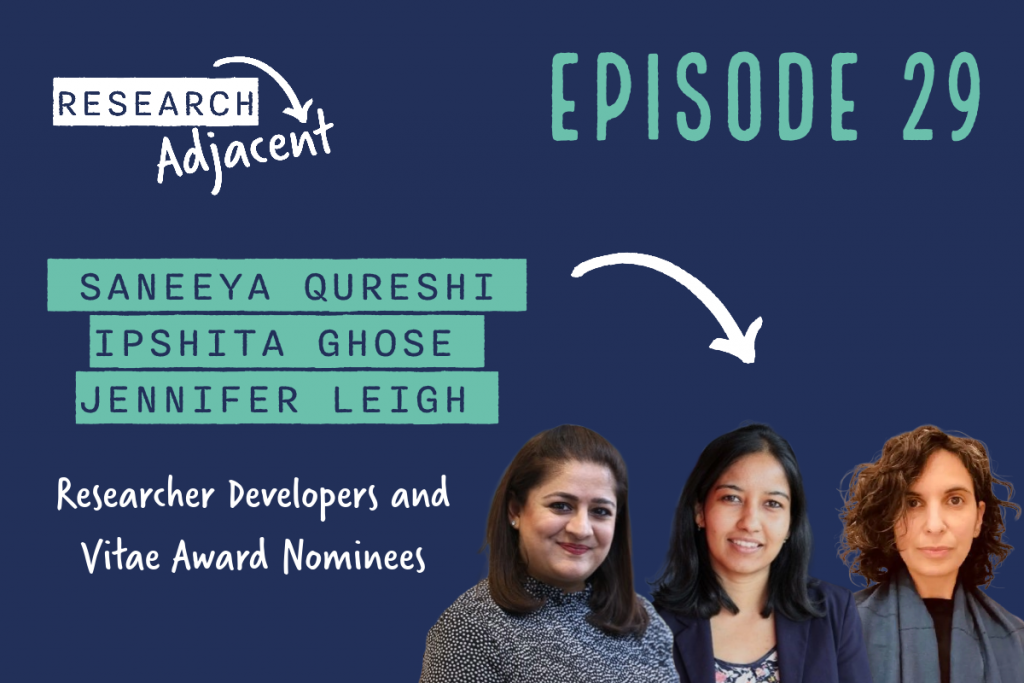Saneeya Qureshi, Ipshita Ghose & Jennifer Leigh, Researcher Developers & Vitae Award Nominees (Episode 29) | Saneeya, Ipshita and Jennifer are making an outstanding contribution

This special extended episode of the Research Adjacent podcast was recorded with a live audience at the Vitae Conference in Manchester, September 2023. Sarah is interviewing Saneeya Qureshi, Ipshita Ghose and Jennifer Leigh, who were all nominated for the Outstanding Contribution category in the Vitae Impact, Culture and Engagement Awards. Saneeya Qureshi is the Head of Researcher Development and Culture at the University of Liverpool. Ipshita Ghosh is Head of Research Strategy and Development, Social Sciences, at the University of Birmingham. Jennifer Leigh is Reader in Creative Practices for Social Justice, at the University of Kent.
As you’ll hear in this episode all of the nominees have made fantastic contributions to research development and research culture, but in the end Saneeya was selected the Outstanding Contribution Award.
The posterchildren for squiggly careers
As has become something of a tradition on the podcast, none of my guests have had a straightforward career. Saneeya began her career as a primary school teacher. She came to the UK for a Masters in special education which turned into a PhD which eventually turned into a researcher developer role. Ipshita also studied for a PhD (in post-colonial literature) but after getting distracted by everyone else’s research decided to look at alternative opportunites. Her job search strategy involved applying for anything with ‘research’ in the title which ultimately led to her first research support officer role. Jennifer initially studied chemistry then, for a variety of reasons including early parenthood, retrained as a yoga teacher and movement therapist. The need to evaluate an Arts Council project took her back into research, although the social sciences and psychology this time, ultimately focusing on research culture.
Creating culture change
Given they were nominated for an Outstanding Contribution Award it will be no surprise to hear that my guest have worked on some amazing projects.
Jennifer’s work centre’s around using creative and collaborative methods to explore ableism and how to support access, retention, and progression for women, those with disabilities, and marginalised groups. This has included work with the International Supramolecular Chemistry Network, the National Association for Disabled Staff Networks, and Empowering Female Minds in STEM (Africa). She has also been creating space for research-adjacent staff to access some of the same development opportunities as researchers.
“It is raising awareness of disability, chronic illness, and neurodivergence, and people are able to talk about it. Policies and practices are being changed in institutions as they’re realizing how the system is systemically and structurally ableist.” Jennifer Leigh
Saneeya is particularly proud of the culture change she has helped embed at Liverpool. This has all come from putting the lived experience of researchers at the heart of decision-making and creating opportunities for personal and professional growth.
“So we very much put the researcher voice at the heart of all that we try to do. It’s also about getting that researcher experience, the lived experience of our researchers into all the decisions that we make.” Saneeya Qureshi
Ipshita gets satisfaction from seeing the researchers that she has supported going on and suceeding. She was also thrilled to have recently led on the submission of a successful research culture funding bid. This Wellcome funding will help them undestand how to make the University of Birmingham, and all research environments, more race-inclusive.
“It’s not just about providing support and interventions for particular groups, but it’s about enhancing our collective awareness of how to make diverse research environments work, because it’s a shared responsibility.” Ipshita Ghose
Less competition, more collaboration
As always I asked my guests what they would change if they had a magic wand. All three wanted to reduce competition and change the way that the current funding system works. Suggestions included funding more pilot studies, penalising failure to collaborate, a basic research income, more recognition for research-adjacent staff and less focus on a few ‘research stars’.
When asked what advice they would give their former selves Saneeya said “It’s okay to keep pursuing your curiosities. You will get there and the best is yet to come.” That seems like good advice to anyone looking to follow in Saneeya, Jennifer or Ipshita’s footsteps.
Thanks to Vitae for hosting this session and thanks to Adam Stevenson and his team from Event Engineering Ltd for recording the session.
Find out more
- Connect with Saneeya on LinkedIn or Twitter
- Connect with Ipshita on LinkedIn
- Connect with Jennifer on LinkedIn or Twitter
Theme music by Vitaliy Levkin from Pixabay